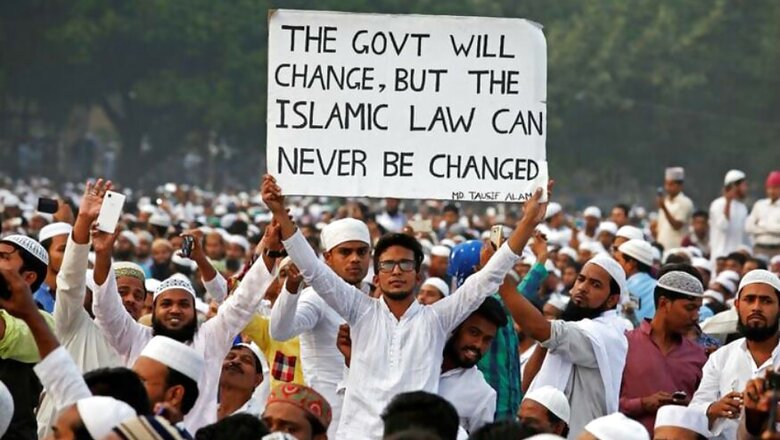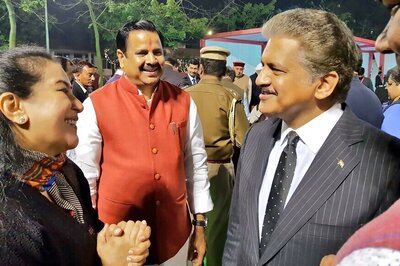
views
In 1937, in an Act protecting personal laws, it was stated that Muslim women organizations condemned the customary law saying the laws were ‘disgraceful’ and demanded that the Shariat law be made applicable to make their life better by acknowledging the right of Muslim women to have properties, right to divorce, right to inheritance etc.
Now, the Triple Talaq Bill proposes to “liberate Indian Muslim Women from age old practice of capricious and whimsical method of divorce”. This change of statement is due to the change of time. Muslims at large in the country need to realize this fact of changed time. In fact, the government also wants Muslims of this country to realize this changed scenario.
An impression is sought to be created that those who raise their voices against the proposed law do not represent the Muslim community. This, despite the fact that even in the absence of a statutory regulation on Talaq, all surveys suggest that in India, divorce rate among Muslims is the least if compared with statutorily regulated divorces.
Section 3 of the Triple Talaq Bill declares uttering talaq three times in one sitting as void and illegal. Section 4 of the bill further adds that the utterance of this non-legal and ineffective words would attract serious criminal charges leading to imprisonment of 3 years. Section 5 talks of subsistence allowance and Section 6 provides for custody of the minor children in favour of the mother.
The question is, if human behaviour could lead to criminalization. The debate is whether for the non-legal, non-effective, non-binding act, utterance without force can be declared a serious criminal offence. Whether criminal jurisprudence permits all non-consequential, non-effective utterances to be criminalized.
With the Supreme Court judgment on Triple Talaq, unregulated behaviour of Muslim men uttering three words would no longer change the marital status of a couple as the wife would still remain his wife.
The utterance shall only fall in the category of an ‘immoral act’ in the realm of private morality in a domestic relationship. It is not serious enough to disturb public order and decency. It is part of the private life of a citizen and does not seek to enforce a particular pattern of human behaviour in public life and hence cannot have criminal ingredient in it.
Mostly, Indian legislative processes follow a certain procedure. Firstly, outside the Parliament by consulting with stakeholders, affected parties, scholars etc and then inside the Parliament by referring it to Select Committees, Standing Committees etc for deliberations.
But in this case, five members of the Cabinet drew up the legislation and placed it before the Lok Sabha in the afternoon and after a short debate, it went to vote and was declared passed. In my view, it has been passed with a misplaced zeal to show the might and strength of brute majority in a representative democracy. It is a classic example of a hurried legislation defeating the essence of democratic process.
Recently, the Supreme Court was examining the issue of child marriage and consequential offence of rape. The government took a stand that “traditionally child marriages have been performed in different parts of the country and therefore such traditions must be respected and not destroyed” and added that “marital rape has potential of destroying the institution of marriage”. Sadly for the present government, the concept of protection of the institution of marriage does not apply to Muslims.
Coming to the issue of the requirement of the proposed law despite the Supreme Court having set it aside. Section 3 of the bill declaring Triple Talaq as void is covered by the Supreme Court’s declared law, while Section 4 of the bill creates a criminal liability. We have an existing legislation of quasi criminal nature regulating domestic issues. It defines “domestic relationship” to mean and include relationship related by consanguinity, marriage, or through a relationship in the nature of marriage.
Thereafter, it defines “verbal and emotional abuse” to include insults, ridicule and humiliation, name calling and repeated threats to cause physical pain. At most, utterance of non-effective Triple Talaq can fall in the category of verbal and emotional abuse. For this abuse, the magistrate is competent to pass a protection order without breaking the family.
Again, Section 5 of the bill relates to subsistence allowance. It appears to be equally unnecessary as there is a provision in the Domestic Violence Act for grant of monetary reliefs by directing the respondent to pay the expenses incurred and losses suffered by the aggrieved persons and any child as a result of the domestic violence, including “the maintenance for the aggrieved person as well as her children”.
Lastly, the bill mulls over the custody for minor children in favour of the mother. The DV Act already has provisions to give the custody of a child to the aggrieved person. In addition, the existing Act has provisions enabling the party aggrieved to approach a civil court, family court or a criminal court, affecting the aggrieved person.
The bill has nothing new except the addition of serious criminal charges which will damage a family and create a fear psychosis of a majoritarian regime.
- Author is Supreme Court lawyer.



















Comments
0 comment